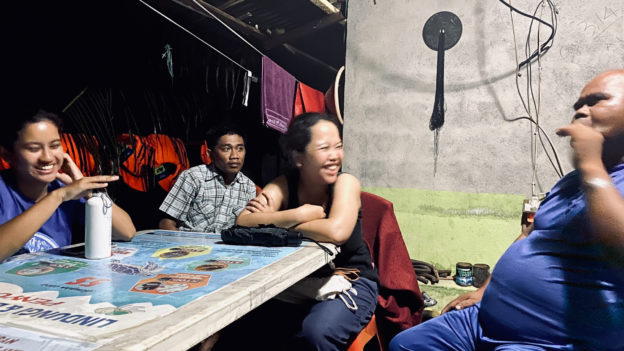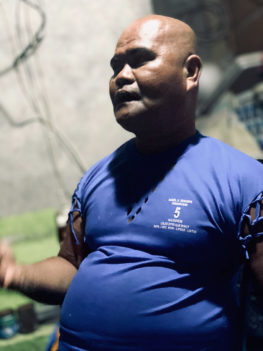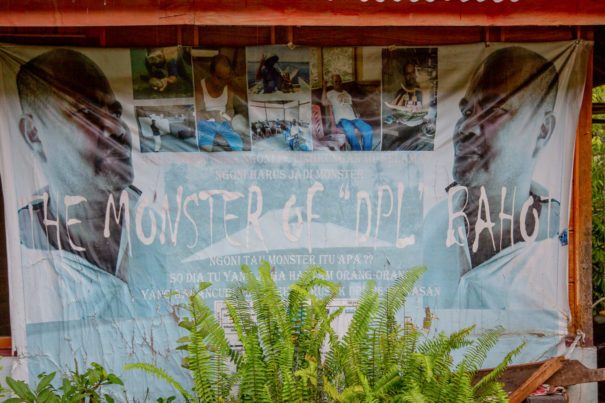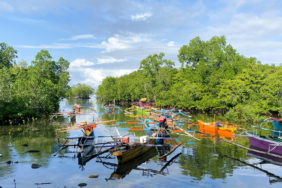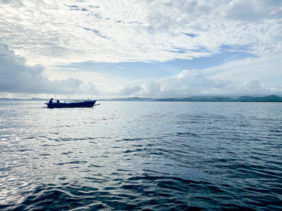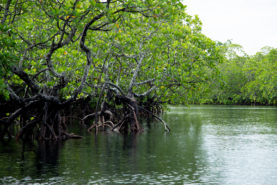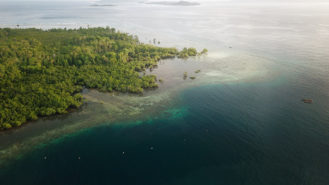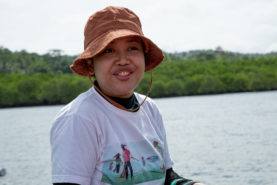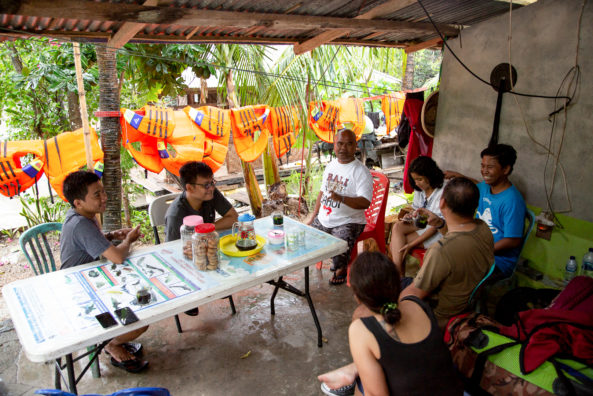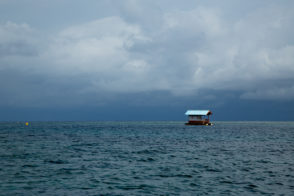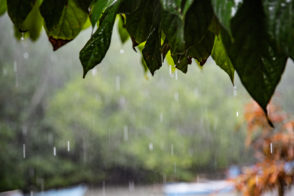This post is also available in:
 Indonesian
Indonesian
Pak* Maxi Lahading is an inspiring character. I first hear him talk about the impact of Bahoi’s locally-led marine protected area (MPA) at a community meeting in Bahoi, a small village in North Sulawesi, Indonesia, and my ears prick up. He speaks of how proud he is of what his village has done so far, but knows there is a way to go. He wants to bring his community together as an example for others, where all community members are engaged and benefiting from natural resource management. It’s a big bold vision, and he has the character to match.
The meeting is part of the early stages of a new international project aiming to conserve vital seagrass ecosystems across five countries – Indonesia, Thailand, Philippines, Malaysia and Timor-Leste. It’s an exciting project, and Blue Ventures is proud to support the national partners, Rumah YAPEKA in Indonesia and the Save Andaman Network (SAN) in Thailand, to incentify and sustainably fund local marine management and conservation activities directly through community based ecotourism business models.
Seagrass is a vital coastal ecosystem that supports around three billion people globally as a source of food and income, and as a natural defence against severe weather conditions. Seagrass meadows are also biodiversity hotspots, home to many juvenile fish and some of the ocean’s most beloved inhabitants – turtles and dugongs – who feast on these plants.
Seagrasses can sequester carbon at two times the rate of terrestrial forests and despite only covering 0.2% of the ocean floor, seagrass accounts for 10% of so-called ‘blue carbon’, alongside mangroves and salt marshes. 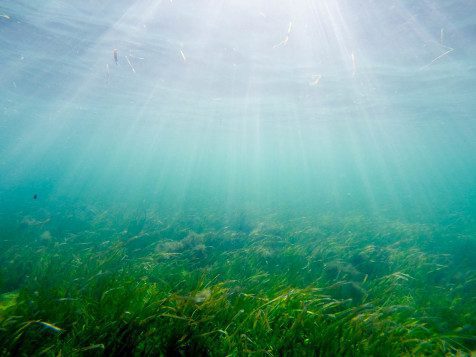 Unfortunately, the health of seagrass ecosystems is increasingly under threat from overfishing, extensive coastal development and our rapidly changing climate. Protecting seagrass is an increasing priority as it is recognised as a ‘secret weapon in the fight against global warming’. Seagrasses can sequester carbon at two times the rate of terrestrial forests and despite only covering 0.2% of the ocean floor, seagrass accounts for 10% of so-called ‘blue carbon’, alongside mangroves and salt marshes.
Unfortunately, the health of seagrass ecosystems is increasingly under threat from overfishing, extensive coastal development and our rapidly changing climate. Protecting seagrass is an increasing priority as it is recognised as a ‘secret weapon in the fight against global warming’. Seagrasses can sequester carbon at two times the rate of terrestrial forests and despite only covering 0.2% of the ocean floor, seagrass accounts for 10% of so-called ‘blue carbon’, alongside mangroves and salt marshes.
In Indonesia, healthy seagrass is a valuable resource; not only for local wildlife and the health of the planet, but for the communities that rely on these ecosystems for food security, local medicines (Pak Maxi told me about a tea they make locally from seagrass roots which is used to help control blood sugar levels and has been tested on mice!) and income generation. Projects like the one we’re collaborating on with YAPEKA and SAN aim to develop a participatory approach to seagrass conservation, and I can see in Bahoi the local leadership is already in place to take this forward.
The meeting was a success, but I was intrigued by Pak Maxi, who had been introduced as ‘The Monster’. Later that day I visit his home to learn more about him, with Ami, Efra and Ai from our partner organisation YAPEKA. As night falls and the rain pours down, we lean in to listen to his story. There is lots of laughter – his answers are long and clearly amusing – and the translation is difficult but Ami, Efra and Ai are all helping to fill in the gaps.
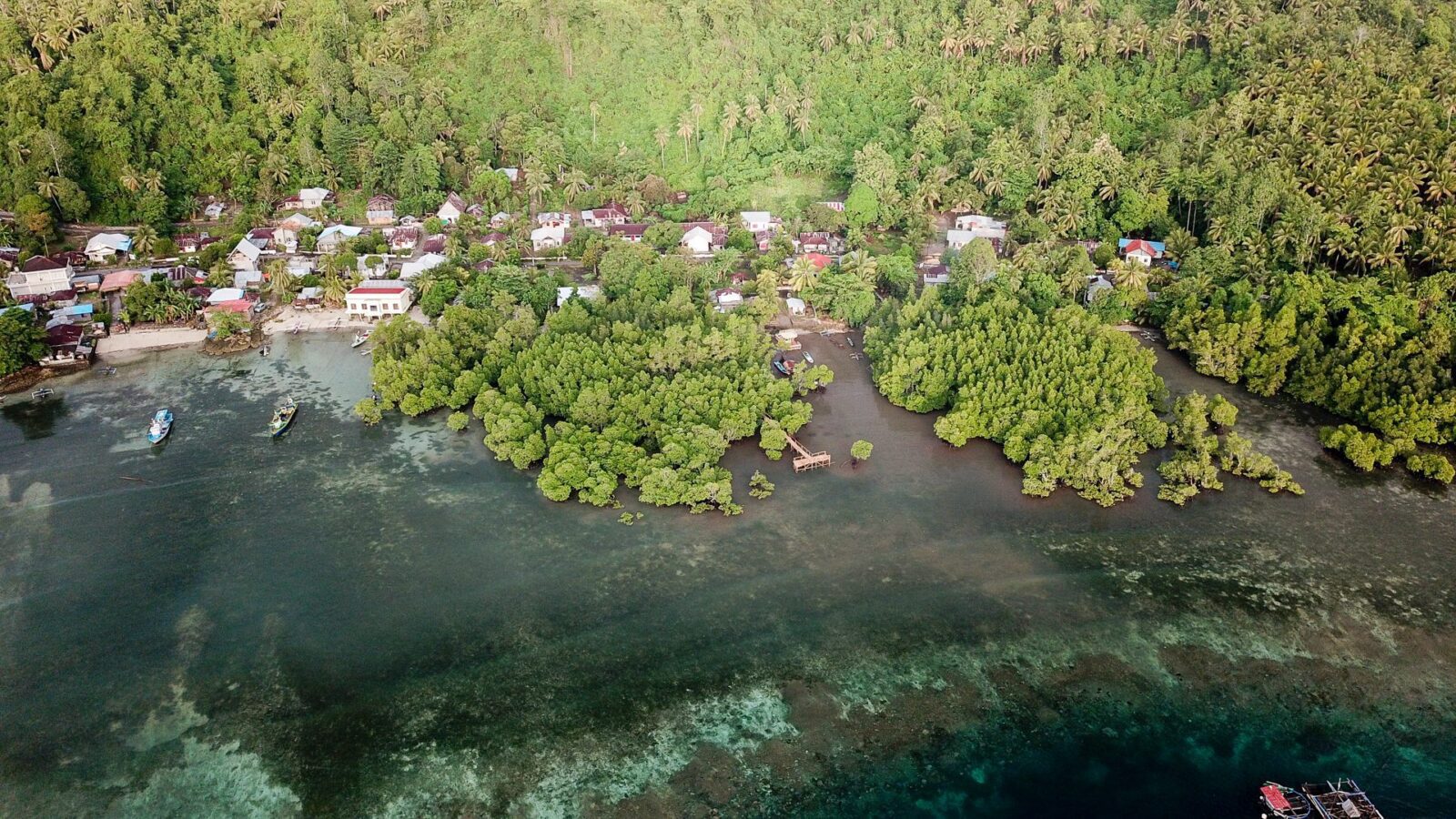
A birds-eye view of Bahoi | Photo: Nick Pilcher/MRF
Whoever loves the environment, it loves them back.”
All of Pak Maxi’s stories revolve around the sea, the importance of protecting it and in particular the marine protected area (MPA) which the community first set up in the early 2000s. He returns time again to the value he sees every day from the work they have already done – he no longer has to go so far to fish and he is seeing bigger fish and more diversity, though still not the bigger pelagic species he remembers from his youth.
Ami leans over to me and whispers ‘basically he is the chief scientist of the village – there isn’t anything he hasn’t observed’.“Beyond the coral reef, only a short swim from his front door, community protection has expanded to mangroves and seagrass areas, and Pak Maxi is not stopping there. He’s noted the slow growth rates of mangrove trees and is particularly keen to stop their destruction as replanting takes so long. Ami leans over to me and whispers ‘basically he is the chief scientist of the village – there isn’t anything he hasn’t observed’.
Like many MPAs, over the years the zone has had problems with enforcement, and that is how Pak Maxi gained his title as ‘The Monster’ which is how he is fondly known in the village and by our colleagues from YAPEKA and further afield. He even has a giant banner with it printed across his home, so he clearly likes his newly found notoriety! He grins when I ask him how he got the name, and an entertaining story unfolds from his youth when his friends called him Julius Caesar, through a Bollywood reference I didn’t quite follow, to 2016 when his nickname finally became ‘the Monster’.
Inside the core MPA no take zone, some fishers were using compressors to fish, which is both environmentally destructive and harmful to the health of the people using them. Pak Maxi saw their destructive behaviour from his house and felt angry at the lack of enforcement. Taking things into his own hands he went out into the MPA and rammed their boat with his until it broke, capturing them and returning them to local law enforcers to punish them in line with the community agreed laws. This was a risky move, as it could have put him at risk of punishment too, but with the backing of the community and his innate passion for protecting the environment, he felt empowered to act. The story of his actions spread quickly, and so the Monster nickname was born.
That is why I am not afraid – I am fighting for the voice of the community, and I have the backing of the village. That is why I don’t mind being ‘The Monster’: I am representing my community. I am willing to put my life on the line, our community cannot live if the MPA fails.”
Again Ami turns to me to emphasise the point: “He takes the big risk, this is the offenders’ livelihood – their boats – he tells me he is willing to give his life to protect the MPA. Sometimes I fear for him. What if something happens?”
The conversation continues at pace – incredible stories of rough storms and rescues at sea, of learning from other communities and a desire to share, of how his son and other younger members of the community are stepping into his shoes. Finally I ask him if he has anything to share with other communities starting this journey, and he tells me that time is hugely important: it took three years of talking to his community to get everyone on board. He literally went door to door to talk to people to build consensus and engagement.
They were aware of what they should do, but it took a long time for action. The whole establishment came from the community – planning, agreement, regulation, setting the markers, we discuss and plan together everything. That is why it has lasted. That is why I am not afraid to act to protect it.”
The next morning I return to try and see the Monster in his natural habitat – on the water. Unfortunately the gods of the weather are not being kind, and the rain pours down heavily for the whole day. Organically, a group forms at the Monsters house; he shares coffee and cake and the conversation flows with plenty of laughter. It all flies over my head, but the atmosphere feels relaxed and welcoming.
After spending time in his home, sharing coffee and laughter with his friends and family, I find it hard to imagine Pak Maxi as a monster – but that is the role he has chosen and which he is proud to fulfil, putting his life on the line for his community and the future of the ocean they rely upon.
Thank you to the United Nations Environment Programme represented by the Secretariat of the Convention on Migratory Species Dugong MOU (UNEP/CMS Secretariat Dugong MOU) for supporting international seagrass ecosystem conservation.
This project is part of the International Climate Initiative (IKI). The Federal Ministry for the Environment, Nature Conservation and Nuclear Safety (BMU) supports this initiative on the basis of a decision adopted by the German Bundestag.
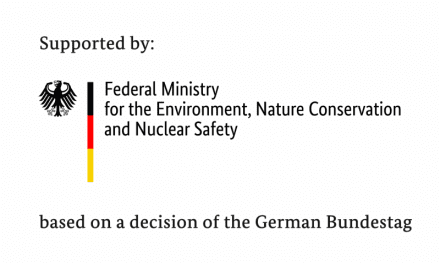


*In Indonesia, ranks and professional titles are are commonly used when addressing people as a sign of respect. It is also customary to use Pak, Bapak or Saudara to address men and Bu, Saudari or Ibu to address women. Pak and Bapak are literally translated as ‘father’.


